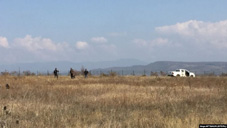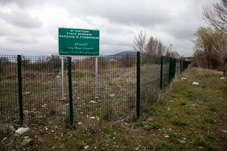
The occupation regime says fences in Atotsi were set up to protect "border"
By Nika Gamtsemlidze
Wednesday, October 23
The so-called government of occupied Tskhinvali region calls erection of barbed wire fences and artificial barriers near the village Atotsi a “one-sided action, aimed at prevention of so-called border.”
According to a statement of the de-facto Security Committee press office, the action by the Ossetian side is conditioned by Tbilisi's refusal to take part in the "demarcation of the state border between South Ossetia and Georgia."
The same statement reads that Davit Katsarava, the leader of the anti occupation movement Strength in Unity, tried to impede the "South Ossetian border guards by his usual theatrical manners” on October 19, accusing the Georgian authorities of pursuing the Kremlin's interests, after which the "Ministry of Internal Affairs of Georgia used force to isolate him.”
The de-facto Security Committee also criticizes the EU Monitoring Mission, which "has, as always, documented the successful actions of Georgian law enforcement agencies and their contribution to promoting stability and security in the region."
“There is no doubt that the actions of Katsarava, the Georgian police and the EUMM are of a coordinated and pre-planned nature and are aimed at achieving specific political goals. Also, they are trying to persuade Georgian population and representatives of the international community that the Georgian side is committed to peace and stability,” reads the statement of the de facto Security Committee.
According to them, “as a result of aggressive actions of official Tbilisi and its western curators there is a tension between the two sides and the only way to de-escalate the tension is a non-aggression agreement between South Ossetia and Georgia, the bilateral commission on delimitation and demarcation of the border with South Ossetia and creating a civilized state establishing relations.”
On October 19, the occupation forces continued the illegal process of borderization in the Atotsi village, Kareli Municipality, setting up barbed wire fences and artificial barriers along the occupation line in the village.
These illegal actions of the occupation forces represent a deliberate provocation that aims at destabilizing the situation in the country. This illegal attempt of escalating the situation further deteriorates already difficult security and human rights situation on the ground, restricts freedom of movement and access of the local population to the agricultural lands.
The illegal process of borderization represents a huge problem for those living near the so-called border. After the war of 2008, Georgian and Russian authorities signed a six-point ceasefire agreement. As the agreement mandates, Russian armed forces should have been “pulled back on the line, preceding the start of hostilities.”
11 years have passed since the war, but occupation forces continue the process of so-called borderization. The process already managed to swallow numerous villages and left people without their homes.


